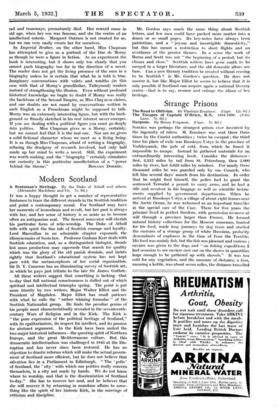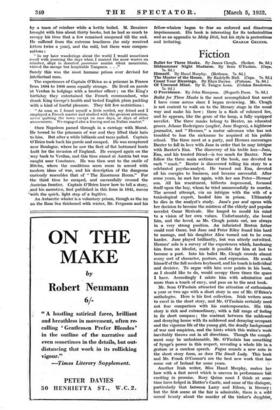Strange Prisons
Harpoon. By Henry Ferguson. (Cape. 7s. 6d.)
SIBERIA was perhaps the strangest prison ever irwented by the ingenuity of rulers. M. Zenzinov was sent there three times by the Czarist authorities ; twice he escaped ; the third time his place of exile was Russkoye Ustye in the province of ,Verkhoyansk, the pole of cold, from which he . found it impossible to escape. Instead he gathered materials for an extraordinarily, interesting book. Consider the distances : first, 3,315 miles by rail from St. Petersburg, then 2,000 miles by river, last 3,620 miles by reindeer. For nearly three thousand miles he was guarded only . by one Cossack, who left him several days' march from his destination. In order that he might feed himself, the police had to grant the sentenced Terrorist a permit to carry arms, and he had a rifle and revolver in his baggage as well as scientific instru- ments supplied by government departments. When he arrived at Russkoye Ustye, a village of about eight houses near the Arctic Ocean, he was welcomed as an important traveller in the special care of the Czar. There for five years the prisoner lived in perfect freedom, with permission to move at will through a province larger than France. He formed natural history collections for the Moscow museums, hunted for his food, made long journeys by dog team and studied the customs of a strange gimp of white Russians, probably descendants of explorers in the time of Ivan the Terrible. His food was mainly fish, but the fish was pleasant and various ; caviare was given to the dogs and "on fishing expeditions I had occasion to see caviare cast out on the shores in quantities large enough to be gathered up with shovels." It was too cold for any vegetation, and the measure of distance, a kess, meaning a kettle, was about seven miles, the distance travelled
by a team of reindeer • while a •kettle• boiled. M. Zenzinov brought with him about thirty books, but he had so much to occupy his time that a few remained unopened till the end. He suffered from the extreme loneliness (he only received letters twice a year), and the cold, but there were compen- sations :
"In my later wanderings about the world I would sometimes recall with yearning the days when I roamed the snow wastes on reindeer, slept in deserted povarnias amidst silent mountains. Visited the savage but hospitable Tunguses. . . ."
Surely this was the most humane prison ever devised for intellectual man.
The experiences of Captain O'Brien as a prisoner in France from 1804 to 1808 seem equally strange. He lived on parole at Verdun in lodgings with a brother officer ; on the King's birthday they entertained the French commandant, who drank King George's health and tasted English plum pudding with a kind of fearful pleasure. They felt few restrictions :
"As soon as I found myself a little settled, my friend and I employed a French master and studied with the greatest attention, never quitting the town except on race days, or days of other amusements. We engaged also a fencing and an Italian master."
• , Once Napoleon passed through in a carriage with Murat. He bowed to the prisoners of war and they lifted their hats to him. But after a while billiards and races palled. Captain O'Brien took back his parole and escaped. He was recaptured -near Boulogne, where he saw the fleet of flat bottomed boats :built for the invasion of England. He escaped again on the :way back to Verdun, and this time aimed at Austria but was caught near Constance. He was then sent to the castle of • Ilitche, where the conditions seem more in accord with modem ideas of war, and his description of the dungeons • curiously resembles that of "The Enormous Room." For the third time he escaped, and successfully crossed the Austrian frontier. Captain O'Brien knew how to tell a story, and his narrative, first published in this form in 1841, moves with the quick, light step of a fugitive.
• An Antarctic whaler is a voluntary prison, though as the ice on the Ross Sea thickened with winter, Mr. Ferguson and his
fellow-whalers began to fear an enforced and disastrous imprisonment. His book is interesting for its technicalities and as an appendix to Moby Dick, but his style is pretentious



















































 Previous page
Previous page